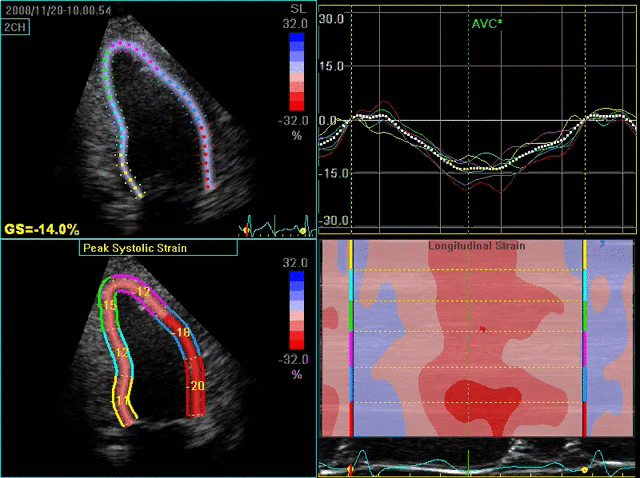- Home
- Lab Pages
- Scherrer-Crosbie Laboratory
Marielle Scherrer-Crosbie, M.D., Ph.D.
Director, Echocardiography Laboratories
Hospital of The University of Pennsylvania
Professor of Medicine
Perelman School of Medicine
Location: South Tower 11-131
Phone: 215-662-3569
Email: marielle.scherrer-crosbie@uphs.upenn.edu
The Scherrer-Crosbie laboratory interest is to further the understanding of heart failure development and progression in animal models and in humans. The interest in subclinical heart failure has led the team to explore two populations of interest, patients with cancer and patients with metabolic abnormalities. Dr. Scherrer-Crosbie is the Director of the Echocardiography Laboratory at the Hospital of the University of Pennsylvania and the Director of the Mouse Echocardiography Core Laboratory in the Cardiovascular Institute. As such, she promotes the use of echocardiography, a crucial tool that allows to link signaling pathways to the organ level, and apply basic research findings to clinical research.

I. Cardiovascular health in patients with cancer
1. Develop noninvasive techniques to identifying cancer patients at high risk of cardiovascular complications.
With the improvement in diagnostic and treatment of cancers, the number of cancer survivors and the length of survival have increased. This leads to an aging population, with increased cardiovascular risk, in particular in patients exposed to cancer treatment-induced cardiotoxicity.
Identifying patients at high risk of cardiovascular events is crucial so that adequate monitoring and potential treatment prevents catastrophic heart failure or other cardiovascular compoications.
We identified sensitive echocardiographic indices of cardiac function and demonstrated their usefulness to predict heart  failure and death in mice treated with anthracyclines. Because this model reflects the typical myocardial damage seen in chemotherapy for breast cancer, we set up a multicenter prospective study assessing similar indices in women with breast cancer. We also studied blood biomarkers to similarly identify patients at high risk.
failure and death in mice treated with anthracyclines. Because this model reflects the typical myocardial damage seen in chemotherapy for breast cancer, we set up a multicenter prospective study assessing similar indices in women with breast cancer. We also studied blood biomarkers to similarly identify patients at high risk.
We are currently studying novel noninvasive indices and markers predicting cardiovascular outcomes and exploring the cardiovascular effects of new treatments.
- Neilan TG, Jassal DS, Perez-Sanz TM, Raher MJ, Pradham AD, Buys ES, Ichinose F, Baynes DB, Halpern EF, Weyman AE, Derumeaux G, Bloch KD, Picard MH, Scherrer-Crosbie M. Tissue Doppler Imaging Predicts Left Ventricular Dysfunction and Mortality in a Murine Model of Cardiac Injury. European Heart Journal 2006; 27:1868-1875.
- Sawaya H, Sebag IA, Plana JC, Januzzi JL, Ky B, Tan TC, Cohen V, Banchs J, Carver JR, Wiegers SE, Martin RP, Picard MH, Gerszten RE, Halpern EF, Passeri J, Kuter I, Scherrer-Crosbie M. Assessment of Echocardiography and Biomarkers for the Extended Prediction of Cardiotoxicity in Patients treated with Anthracyclines, Taxanes and Trastuzumab. Circ Cardiovasc Imaging. 2012; 5: 596:603 PMID: 22744937
- Ky B, Putt M, Sawaya H, French B, Januzzi JJ, Sebag I, Plana JC, Cohen V, Banchs J, Carver JR, Wiegers SE, Martin RP, Picard MH, Gerszten RE, Halpern EF, Passeri J, Kuter I, Scherrer-Crosbie M. Early Increases in Multiple Biomarkers Predict Subsequent Cardiotoxicity in Breast Cancer Patients Treated with Doxorubicin, Taxanes, and Trastuzumab. J Am Coll Cardiol 2014 Mar 4;63(8):809-16. PMID: 24291281
- Ali MT, Yucel E, Bouras S, Wang L, Fei HW, Halpern EF, Scherrer-Crosbie M. Myocardial Strain Is Associated with Adverse Clinical Cardiac Events in Patients Treated with Anthracyclines. J Am Soc Echocardiogr. 2016 Jun;29(6):522-527.e3. doi: 10.1016/j.echo.2016.02.018. Epub 2016 Apr 8. PMID: 27068546
- Cheng KH, Handschumacher MD, Assuncao BM, Sebag IA, Halpern EF, Scherrer-Crosbie M. Contraction Timing Patterns in Patients Treated for Breast Cancer Before and After Anthracyclines Therapy. J Am Soc Echocardiogr. 2017 Mar 2. pii: S0894-7317(16)30761-1. doi: 10.1016/j.echo.2016.12.013. [Epub ahead of print] PMID 28262302
- Assuncao BMBL, Handschumacher MD, Brunner AM, Yucel E, Bartko PE, Cheng KH, Campos O, Fathi AT, Tan TC, Scherrer-Crosbie M. Acute Leukemia is Associated with Cardiac Alterations before Chemotherapy. J Am Soc Echocardiogr. 2017 Nov;30(11):1111-1118. doi: 10.1016/j.echo.2017.07.016. Epub 2017 Sep 15. PMID: 28927558

2. Investigate potential treatments to prevent cardiotoxicity in patients with cancer treated with chemotherapy
Investigators are attempting to decrease chemotherapy-induced cardiotoxicity, in particular anthracyclines-induced cardiotoxicity by preventively treating patients with cardiovascular drugs.
In collaboration with Dr. Neilan at Massachusetts General Hospital in Boston, we are spearheading a NIH-funded multicenter randomized study investigating the effects of statins on anthracyclines-induced cardiotoxicity in patients with Non-Hodgkin lymphoma.
II. Brown Adipose Tissue, Heart Failure and Cardioprotection.
Following a long standing interest in the cardiac effect of metabolic abnormalities, our team became interested in brown adipose tissue, a tissue that has been detected in adult humans in the last decade, and consumes glucose and lipids to produce heat. We developed an echo-based technique to detect brown adipose tissue and estimate its function.
More recently, we have investigated the relationships between brown adipose tissue and cardiovascular health. We are currently working on several NIH funded projects investigating the relationship between brown adipose tissue and myocardial injury and remodeling.
- Baron DM, Clerte M, Brouckaert P, Raher MJ, Flynn AW, Zhang H, Carter EA, Picard MH, Bloch KD, Buys E, Scherrer-Crosbie M. In Vivo Noninvasive Characterization of Brown Adipose Tissue Blood Flow by Contrast Ultrasound in Mice. Circ Cardiovasc Imaging. 2012; 5: 652-659 PMID: 22776888- best paper in basic imaging in Circulation Cardiovascular Imaging.
- Thoonen R, Ernande L, Cheng J, Nagasaka Y, Yao V, Miranda-Bezerra A, Chen C, Chao W, Panagia M, Sosnovik DE, Puppala D, Armoundas AA, Hindle A, Bloch KD, Buys ES, Scherrer-Crosbie M. Functional Brown Adipose Tissue Limits Cardiomyocyte Injury and Adverse Remodeling in catecholamine-induced cardiomyopathy. J Mol Cell Cardiol. 2015 84:202-211 PMID: 25968336
- Ernande L, Stanford KI, Thoonen R, Zhang H, Clerte M, Hirshman MF, Goodyear LJ, Bloch KD, Buys ES, Scherrer-Crosbie M. Relationship of brown adipose tissue perfusion and function: a study through beta 2 adrenoreceptor stimulation. J Appl Physiol. (1985). 2016 Jan 28:jap.00634.2015. doi: 10.1152/japplphysiol.00634.2015. [Epub ahead of print] PMID: 26823340
- Thoonen R, Scherrer-Crosbie M. Brown adipose tissue: the heat is on the heart. Am J Physiol. 2016 Jun 1;310(11):H1592-605. doi: 10.1152/ajpheart.00698.2015. Epub 2016 Apr 15. Review PMID:27084389


